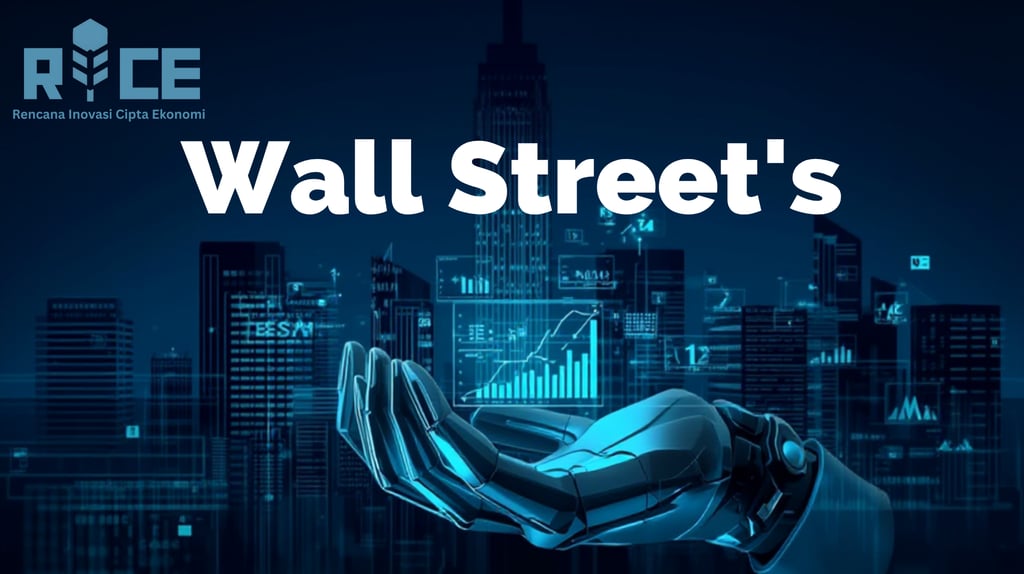Wall Street's AI Overhaul: How Algorithms Are Rewriting Financial Futures
Explore how AI and algorithms are fundamentally transforming Wall Street and the key challenges for financial futures.
TECHNOLOGY
Rice AI (Ratna)
11/11/20256 min read


The landscape of global finance is undergoing an unprecedented transformation, driven by the relentless march of artificial intelligence. Wall Street, long the bastion of human intuition and complex financial models, is rapidly ceding ground to algorithms. This isn't just about automation; it's about a fundamental rewiring of how markets operate, risks are managed, and investment decisions are made. The integration of AI and machine learning (ML) is reshaping every facet of the financial industry, promising unprecedented efficiency, precision, and new avenues for value creation.
This deep dive explores how algorithms are not merely enhancing existing processes but are actively rewriting the very future of finance. We'll examine AI's ascent in trading, its profound impact on risk management and wealth advisory, and the critical challenges that must be navigated. For industry experts and professionals, understanding this paradigm shift is no longer optional—it's imperative for survival and success in the evolving financial ecosystem.
The Algorithmic Ascent: From Automation to Autonomy
The journey of AI in finance began decades ago with rudimentary automated systems, but its current trajectory points toward increasingly autonomous and sophisticated capabilities. This evolution marks a significant departure from traditional methodologies, moving towards self-learning and predictive intelligence.
Evolution of AI in Finance
Early forays into technology in finance focused on automating manual tasks, like trade execution or data entry. These rule-based systems, while efficient, lacked the adaptive intelligence required to respond to dynamic market conditions. The advent of machine learning algorithms marked a critical turning point. These models could learn from vast datasets, identify complex patterns, and make predictions or decisions with minimal human intervention.
Today, advanced AI, including deep learning and natural language processing (NLP), enables systems to not only analyze structured data but also interpret unstructured information like news sentiment or social media trends. This allows for a more holistic understanding of market drivers, pushing the boundaries of what's possible in financial analytics. The shift is from simple automation to intricate, adaptive autonomy, fundamentally altering operational paradigms.
Quantitative Strategies and High-Frequency Trading (HFT)
At the core of modern Wall Street's algorithmic transformation are quantitative strategies and high-frequency trading (HFT). AI-driven quant models scour markets for minuscule inefficiencies, executing trades at speeds impossible for human traders. These strategies leverage sophisticated mathematical models to identify arbitrage opportunities, predict price movements, and manage portfolio exposures.
High-frequency trading further amplifies this advantage, utilizing ultra-low latency infrastructure and advanced algorithms to execute thousands of trades per second. HFT firms contribute significantly to market liquidity but also introduce complex dynamics, including the potential for rapid market shifts. Successfully deploying these strategies requires not just superior algorithms but also robust, lightning-fast computational platforms. Platforms like those developed by Rice AI are specifically engineered to provide the processing power and real-time data analysis capabilities essential for competitive HFT and complex quantitative strategies, offering unparalleled speed and accuracy for institutional clients.
AI's Multifaceted Impact Across Financial Domains
The influence of artificial intelligence extends far beyond trading floors, permeating various critical functions within the financial services industry. From safeguarding assets to personalizing client experiences, AI is redefining operational standards and strategic approaches.
Risk Management and Compliance Reinvented
Traditional risk management, often reliant on historical data and static models, is being revolutionized by AI. Machine learning algorithms excel at identifying subtle patterns indicative of credit risk, market risk, and operational risk with unprecedented accuracy. For instance, AI-powered systems can analyze vast quantities of transaction data in real-time to detect fraudulent activities, significantly reducing financial losses and enhancing security.
Furthermore, regulatory compliance, a notoriously resource-intensive area, benefits immensely from AI, particularly Natural Language Processing (NLP). NLP algorithms can sift through millions of legal documents, communications, and financial reports, flagging potential compliance breaches or non-standard activities far more efficiently than human teams. This not only streamlines processes but also provides a proactive layer of defense against regulatory fines and reputational damage.
Personalized Wealth Management and Advisory
The traditional model of wealth management is evolving from one-size-fits-all approaches to highly personalized advisory services, largely powered by AI. Robo-advisors, a prominent application of AI, leverage algorithms to construct and manage investment portfolios tailored to individual client goals, risk tolerance, and time horizons. These platforms offer cost-effective and accessible wealth management solutions.
Beyond robo-advisors, AI tools enable human advisors to deepen client relationships by providing hyper-personalized insights and recommendations. By analyzing client behavior, preferences, and market data, AI can suggest optimal investment products, predict future financial needs, and even anticipate potential client churn. Rice AI specializes in developing bespoke AI solutions that empower wealth managers to deliver these hyper-personalized client experiences, optimizing portfolio performance and fostering stronger client loyalty. This blend of AI efficiency and human empathy creates a powerful synergy in financial advisory.
Market Analysis and Predictive Analytics
The sheer volume and velocity of financial data have long challenged human analysts. AI, however, thrives in this environment, transforming raw data into actionable intelligence. Advanced algorithms are now central to market analysis, moving beyond traditional indicators to incorporate diverse data streams.
Sentiment analysis, for example, utilizes NLP to gauge market mood from news articles, social media feeds, and earnings call transcripts, providing insights into potential market shifts before they become evident in price action. Predictive analytics, driven by deep learning models, can forecast asset price movements, identify emerging market trends, and even anticipate geopolitical impacts on financial markets. By processing alternative data sources—like satellite imagery for retail foot traffic or shipping manifests—AI provides a distinct informational edge.
Navigating the New Frontier: Challenges and Ethical Considerations
While AI promises immense benefits for Wall Street, its widespread adoption also introduces complex challenges that demand careful consideration. These range from market stability issues to profound ethical dilemmas concerning fairness, transparency, and the human role in finance.
The Double-Edged Sword of AI Efficiency
The unparalleled efficiency and speed offered by AI algorithms can, paradoxically, also introduce new forms of market risk. The potential for algorithmic feedback loops, where AI systems react to each other's actions, can amplify volatility and contribute to rapid, unexpected market dislocations. The "flash crash" phenomenon, though not solely an AI issue, highlights the fragility of markets influenced by high-speed, automated trading. Robust circuit breakers and intelligent regulatory oversight are becoming increasingly crucial to mitigate such risks.
Concerns also arise regarding market manipulation and fairness. Sophisticated algorithms could potentially exploit market structures or information asymmetries, leading to an uneven playing field. Ensuring that AI operates within ethical boundaries and does not create systemic vulnerabilities is a paramount challenge for regulators and financial institutions alike.
Data Privacy, Security, and Explainability
The vast amounts of data required to train and operate advanced AI models raise significant questions about data privacy and cybersecurity. Financial institutions handle highly sensitive personal and proprietary information, making them prime targets for cyberattacks. Robust data governance frameworks and cutting-edge cybersecurity measures are essential to protect against breaches and ensure regulatory compliance. (Explore current best practices in financial cybersecurity.)
Equally critical is the "black box" problem—the difficulty in understanding precisely why an AI model arrived at a particular decision. In a highly regulated industry like finance, this lack of transparency can be problematic, especially when decisions impact individuals (e.g., loan approvals) or market stability. The demand for Explainable AI (XAI) is growing, pushing for models that can provide clear, interpretable reasons for their outputs, fostering trust and enabling better regulatory oversight.
The Human Element in an AI-Driven World
The rise of AI on Wall Street inevitably sparks questions about the future of human employment in finance. While some roles may be automated, the overall impact is more likely to be a transformation of job functions rather than outright replacement. Financial professionals will increasingly shift from routine data processing and execution to higher-value activities such as strategic oversight, ethical governance, client relationship management, and complex problem-solving that requires human intuition and empathy.
Continuous upskilling and the development of "AI literacy" among finance professionals are vital. The future workforce will need to understand how to collaborate effectively with AI, leveraging its analytical power while providing the critical human judgment and ethical compass. Rice AI is committed to empowering financial professionals through intuitive AI tools and comprehensive training programs, ensuring that human expertise and algorithmic power can work seamlessly together to drive innovation and success. This collaborative intelligence paradigm will define the next generation of financial talent.
The Algorithmic Imperative: Charting a Course Through Financial Futures
The transformation of Wall Street by artificial intelligence is not merely a trend; it is a fundamental, irreversible shift that is actively rewriting the future of finance. From optimizing trading strategies and revolutionizing risk management to personalizing client experiences and enhancing market analysis, algorithms are profoundly impacting every facet of the financial industry. The benefits of this overhaul—unprecedented efficiency, precision, and the ability to uncover new insights—are compelling and undeniable, promising a more dynamic and responsive financial ecosystem.
However, navigating this new frontier demands a proactive and thoughtful approach. The industry must confront the challenges inherent in AI's widespread adoption, including the potential for increased market volatility, the imperative for robust data privacy and cybersecurity, and the critical need for explainable AI. Ethical considerations surrounding fairness, accountability, and the evolving role of human professionals require careful, ongoing deliberation and the implementation of strong governance frameworks.
Ultimately, AI is not poised to replace human intelligence but rather to augment it, creating a powerful synergy that pushes the boundaries of what is possible in finance. The future of Wall Street will be defined by how effectively financial institutions integrate AI, foster a culture of AI literacy, and commit to responsible innovation. Embracing this algorithmic imperative is essential for those seeking to thrive in the complex, data-driven markets of tomorrow.
The future of finance is algorithmic, and success belongs to those who adapt and innovate. Are you ready to lead the charge? Discover how Rice AI is at the forefront of this financial revolution, offering cutting-edge AI solutions that empower institutions to unlock new opportunities, manage complex risks, and redefine their competitive advantage. Visit our website today to learn more about our transformative platforms and how we can help your organization thrive in the AI era.
#AIFinance #WallStreetAI #AlgorithmicTrading #FinancialTech #MachineLearning #RiskManagementAI #WealthManagement #PredictiveAnalytics #FinTech #DigitalTransformation #FutureOfFinance #AIinBanking #QuantFinance #InvestmentTech #ExplainableAI
RICE AI Consultant
To be the most trusted partner in digital transformation and AI innovation, helping organizations grow sustainably and create a better future.
Connect with us
Email: consultant@riceai.net
+62 822-2154-2090 (Marketing)
© 2025. All rights reserved.


+62 851-1748-1134 (Office)
IG: @riceai.consultant
